


















































An ambassadorial round table on the great partnership opportunities offered by the Algerian market was organized in the boardroom at our Mayfair premises, in the presence of nearly a hundred representatives of economic groups and various companies.

Algeria’s ambassador to London, His Excellency Mr Nourredine Yazid, took advantage of the meeting organized on the morning of Thursday 26 September 2024 by the Arab-British Chamber of Commerce to showcase Algeria’s economic potential in terms of investment, trade and partnerships and to inform delegates about new legislation and incentives to further improve the business climate.
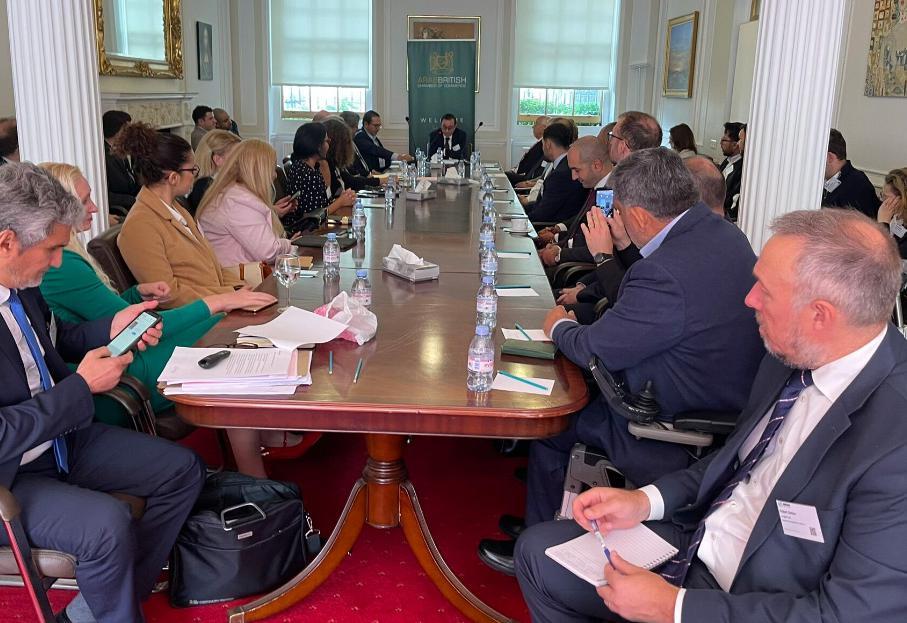
Supported by data and reports from the World Bank and the IMF, the ambassador showed that “the Algerian economy has experienced a new dynamic in recent years. It is strengthening and diversifying, recording a significant increase in nonhydrocarbon exports. The country is now one of the most attractive markets in the region.”
Deep and structural reforms have been carried out by the Algerian government under the leadership of the President of the Republic, Mr. Abdelmadjid Tebboune, to correct economic imbalances through the improvement of the investment environment, the promotion of foreign trade, the encouragement of initiatives, the adoption of digitalization and the reform of
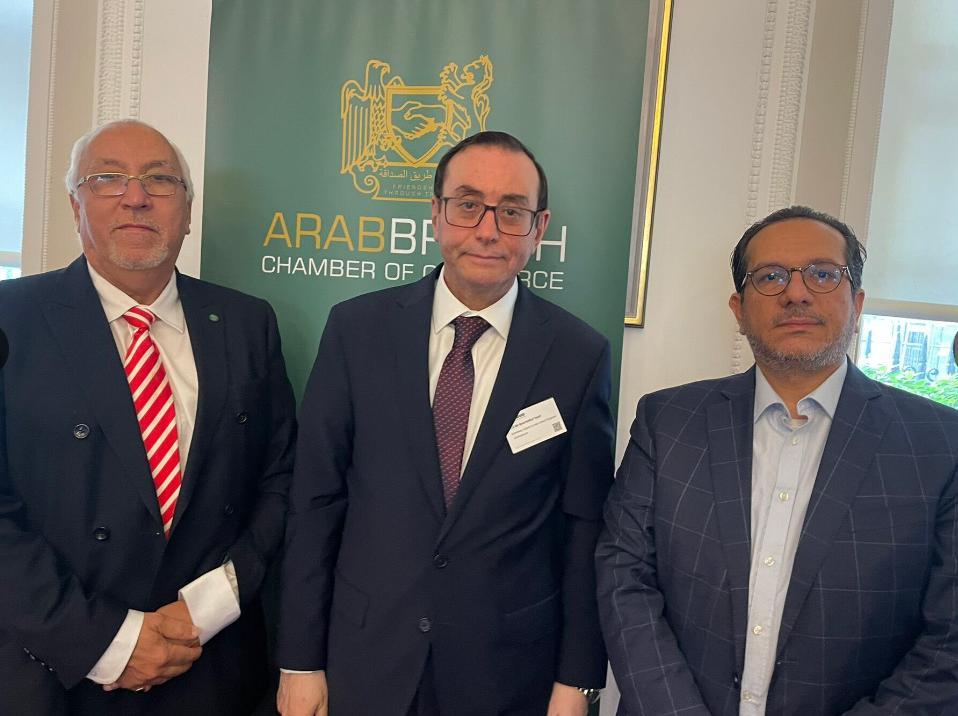
monetary policy to align it with global economic transformations, Mr Yazid stressed, noting that Algeria has further opened its economy to foreign investment with the approval of the new investment law in July 2022 and the eight implementing texts in September 2022.
In this regard, the ambassador drew the attention of the audience to the fact that the new legal framework of investment breaks with certain measures that were very restrictive for the act of investing in the past, including the so-called 49-51% rule.
Better still, it is considered one of the most advantageous and attractive that Algeria has known. The law enshrines and reaffirms the freedom of investment. Transparency and equal treatment of domestic and foreign investors have been formally adopted, the ambassador said.
In addition, the diplomat added, Algeria, which is emerging as an attractive investment destination, offers a unique combination of comparative advantages for entrepreneurs: proximity to markets, regional connectivity, potential as a logistics centre, geopolitical stability, natural resources, varied climatic
conditions, regional opportunities, access to new markets and the possibility of creating special economic zones. Not to mention the investment-friendly ecosystem of large and modern electricity and natural gas networks, road and rail networks, ports, and other essential infrastructure.
Remarking on the vision behind the development of the new law, Mr. Yazid listed the sectors identified as priorities to attract investment and diversify the country’s economy. “These sectors are essential to reduce Algeria’s dependence on hydrocarbons and promote sustainable economic growth. Sectors aligned with Algeria’s strategic objectives in terms of economic diversification, job creation and sustainable development,” he explained.
For the ambassador, the growing interest of foreign investors in Algeria undeniably indicates the effectiveness of its strategy of openness and economic diversification, which is gradually taking shape in an international context of strong competition for the capture of FDI.
As a result, in 2023, Algeria attracted a total volume of Foreign
Direct Investment (FDI) of about $1.21 billion, and ranks first in the Maghreb, said the ambassador, referring to an UNCTAD report published in June 2024 which shows a significant increase compared to previous years.
In addition, he added, at the end of July, the Algerian Investment Promotion Agency (AAPI) had registered 8,465 investment projects during the period from November 1, 2022 to July 31, 2024, and expected to generate 210,000 direct jobs.
The ambassador also mentioned the many large-scale foreign investment projects, particularly in the energy, renewable energy, agriculture and agri-food, industry, technology and tourism sectors, launched in partnership with countries such as Turkey, Qatar, Italy, the United States, China and Malaysia.
Mr Yazid concluded by assuring British business executives and investors of the determination of the Algerian authorities to build a strong, dynamic, resilient and diversified economy and to guarantee all facilities to attract and promote British FDI in Algeria.
During the debate that followed the ambassador’s presentation, the speakers, who included representatives of leading economic groups, captains of industry and tech entrepreneurs introducing their innovations, outlined the concerns that, in their eyes, are holding back their momentum towards the Algerian market, more particularly the issues of visas, land and the repatriation of dividends. Questions to which Mr. Nourredine Yazid provided answers that dispelled any apprehensions and misunderstandings.
The roundtable was hosted by Mr Bandar Reda, ABCC Secretary General & CEO, with the participation of Mr Abdeslam El Idrissi, ABCC Deputy CEO & Secretary General, and chaired by the ABCC Chairman.
Source: Algeria Press Service (edited)

11th September 2024
ABCC Premises Mayfair London

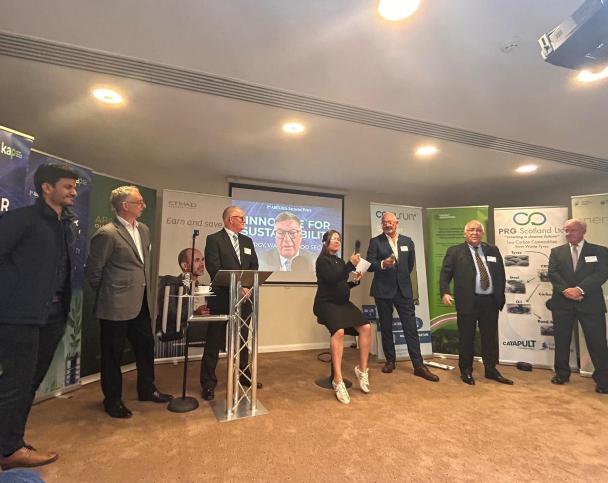
The event, held in the auditorium at the ABCC’s Mayfair premises on 11 September 2024, was completely sold out and generated an inspiring discussion on the key issues of energy, water and food security viewed from the perspective of sustainability.




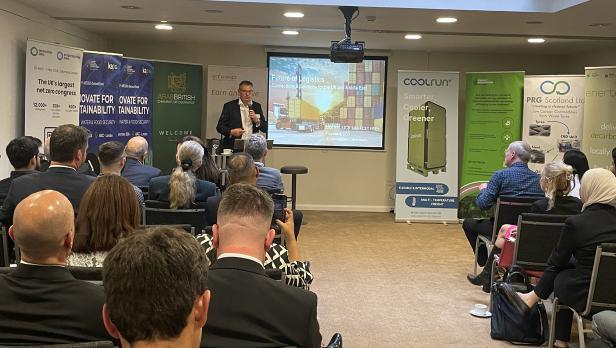
An impressive group of top level tech entrepreneurs and cutting edge innovators were brought together by the ABCC for the Innovate for Sustainability event.
Organised in conjunction with ABCC member company, Kantar Advisory Partners, the inspiring business event showcased some remarkable innovative products and solutions that had been designed with the express purpose of addressing the challenge of climate change and reducing carbon emissions in key areas of energy, food production, water purification, environmental protection, recycling and transport.
The occasion witnessed some important announcements as Etihad Airways was welcomed as the latest new gold member of the ABCC, and the Chamber was commended for achieving its silver accreditation for Corporate Social Responsibility.
In her opening remarks, Rt Hon Baroness Symons of Vernham Dean, ABCC Chairman, stated that sustainability had become a key driver of innovation as the world worked to reach its net zero targets.
Such efforts were a prerequisite for meeting sustainable development goals, protecting the planet and ensuring future prosperity, she said.
The reputation of UK industry for innovation opened up the prospect of closer cooperation with Arab partners as we worked together to meet these challenges.
Rt Hon Baroness Symons looked forward to hearing details about the innovations that were the focus of the afternoon’s discussion. She paid tribute to the ABCC for its work and encouraged people to take part in the forthcoming Arab British Economic Summit in November, which promised to be a great inspiring event.
Mr Abdeslam El-Idrissi, ABCC Deputy CEO & Secretary General, highlighted the
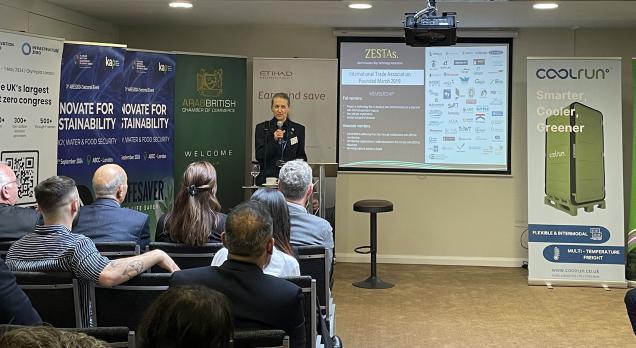
role of the ABCC in supporting businesses through its legal, documentation and mediation services. Mr El Idrissi urged more companies to join the ABCC and commended the Chamber’s team who were always available to assist.
The discussion with the tech innovators was compered by Sarah Russis, an international event host and presenter, who expertly navigated the often complex technical issues by ensuring that attention was firmly fixed on the inspiring aspects of the innovations and their practical applications.
Speakers explained the real benefits to be gained from their innovations for key sectors like energy, food security, water and transport and they were keen to reach out to potential partners and investors in the Arab world.
A presentation was delivered by Kevin Aisbitt from the Energy Innovation Agency, which was set up in Manchester in 2021 to enable the city to meet net zero by 2028 and was working alongside to achieve this ambitious target. He stressed that the agency wanted to work closer with organisations in the Middle East to help them reduce carbon emissions.
John Lucy, CEO of JL International, explained his consultancy work with innovators that were seeking to decarbonise the transportation of goods. Mr Lucy said that his focus was on working with road transport companies in the Arab region and he was drawing on his previous experience when he was involved in the development of regional freeports in the UK.
Madadh Maclaine, founder of Zestas, an international trade association, outlined her vision of achieving net zero in the global maritime industry by looking at the impact of shipping on the health of the world’s oceans. She argued that green hydrogen offered an effective efficient solution for ending the destructive pollution of the seas.
Other speakers included John Archer, chief scientific officer at Hutanbio, a low carbon biofuels expert, Dominic Quennell, CEO, Enertechnos Ltd, whose mission was to increase the efficiency of electrical distribution cables, and Richard Hutchins, of PRG Scotland Ltd, which was recycling material from old tyres to create low carbon materials for the road construction industry and reduce the carbon footprint.
The Innovate for Sustainability event, taking as its subtitle, Energy, Water and Food Security, proved to be highly successful in drawing wider attention to some fascinating and inspiring examples of some UK based innovations which have practical applications offering the potential to bring real benefits to people and industries across the Arab world and, indeed, internationally.
The event was held in the run up to ABES2024, which has now been unavoidably postponed until June 2025.


The ABCC was honoured by a visit on 17 October 2024 from His Excellency Babikir Elsiddig M Elamin, the Sudan Ambassador to the UK, who was welcomed by Mr Bandar Reda, ABCC Secretary General & CEO. Their discussions at the Chamber’s Mayfair premises focused on how the Chamber and the Sudanese Embassy can collaborate to strengthen trade and business relations between the UK and Sudan.



Mr Bandar Reda, CEO & Secretary General, paid a visit to the headquarters of the London Chamber of Commerce and Industry, on 16 October 2024, where he was warmly received by Mr Karim Fatehi MBE, CEO, LCCI. The two chief executives held discussions on closer working with the aim of improving the services delivered to our members.





With over 40 years’ experience in technical translation, the Arab-British Chamber of Commerce specialises in Arabic/English and English/Arabic translation and has excellent facilities and top quality translators.
Our translators are officially qualified and trained to handle customer requirements accurately and professionally in both languages. Our experience lies in first class commercial, financial, legal and technical translation of the highest standard.
The Chamber’s translation service is officially recognised by all the Arab embassies in London and by the Foreign, Commonwealth & Development Office (FCDO).
However, we strongly advise clients that the FCDO should authenticate all official documentation translated from Arabic to English if it is to be used in the UK. Translation of official documents from English to Arabic, for use in the Arab world, must be authenticated by both the FCO and the Arab embassy of the country where the document is to be used.
The ABCC translation service covers all types of documents, including:
Birth/marriage/baptism/divorce/death certificates
Certificates of academic qualification
Certificates of Origin
Commercial invoices
Company/personal financial documents
Divorce documents from the Shar’i Mazun or from a court of law
Memorandum & Articles of Association
Passport details.
The ABCC proudly presents this trade fair in partnership with the Libyan Businessmen Council.
In cooperation with the Libyan Businessmen Council, the Arab British Chamber of Commerce is pleased to announce that we will be holding a Business Fair at the Thistle Hotel, Marble Arch, London.
WEDNESDAY, 20 NOVEMBER 2024 (10AM TO 4PM )
VENUE: THISTLE MARBLE ARCH
This multi-sector fair will showcase the latest products, services and expertise of leading Libyan companies as the country embarks on a process of economic diversification. This event will enable participants to explore the growing commercial opportunities in the Libyan


market and help forge strategic links between UK companies and their Libyan counterparts.
Join us for what promises to be a unique business networking experience with distinguished Libyan business executives.
Held in close cooperation with the Embassy of Libya in London.
Register https://abcc.glueup.com/ event/121874/register/

Thursday, 14th November 2024, at
The Forum aims to strengthen the long-standing and multifaceted partnership between the United Kingdom and Dubai, a relationship that has historically laid the foundation for substantial bilateral trade and investment. It will highlight new opportunities for collaboration, particularly in the areas of business, finance, education, creative industries, and technology, including green tech and AI.
Dubai’s ambitious D33 economic agenda offers a myriad of opportunities to businesses as it aims to:
Promote the growth of the digital economy by attracting tech startups and experts.
Strengthen Dubai’s role as a global business enabler and logistics hub.
Foster a vibrant financial ecosystem and support innovation and entrepreneurship.
Promote sustainable practices and initiatives to ensure long-term economic growth.
Featuring high-level delegates, including industry leaders, key decision-makers, and top-tier investors, the Dubai Business Forum UK will offer an unparalleled platform for networking and forging new strategic partnerships.
For further information about the forum see https:// dubaibusinessforum.com/

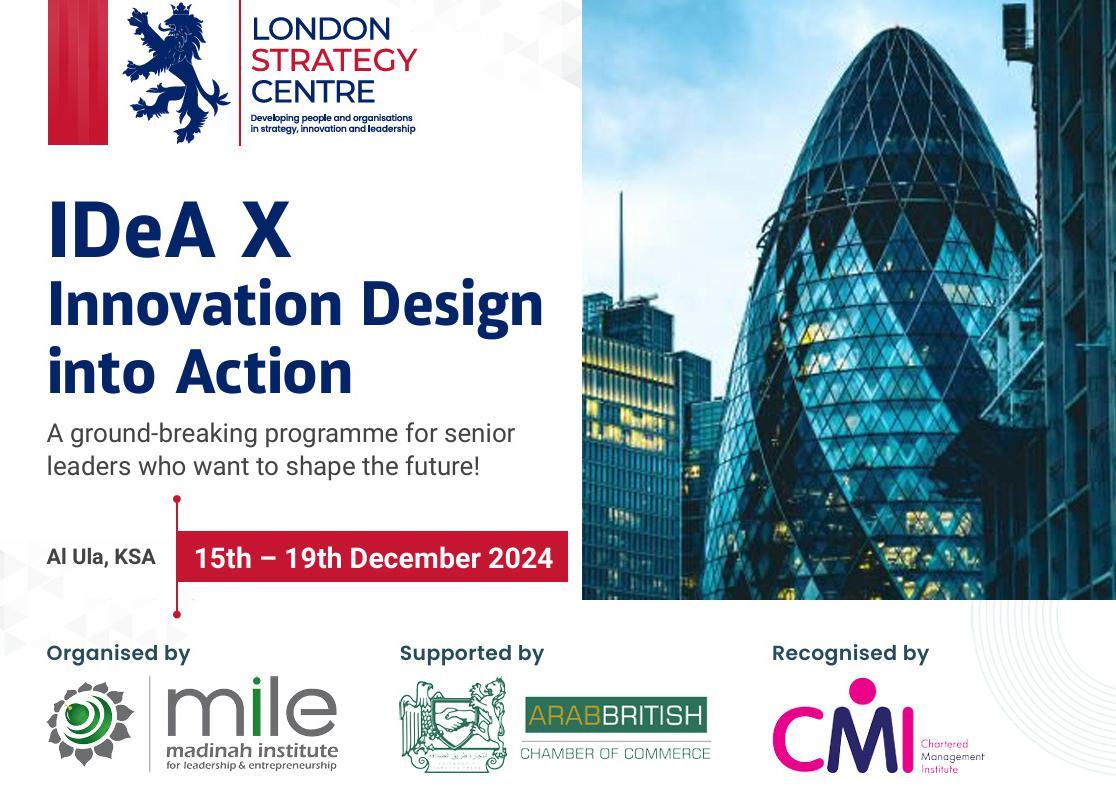
A ground-breaking programme for senior leaders who want to shape the future
Event by London Strategy Centre (LSC) (ABCC member company)
Dec 15, 2024, 5:00 AM - Dec 19, 2024, 2:00 PM (your local time)
Al Ula KSA, Al Ula City, Medina, Al Madinah, KSA
An overview of the programme, its objectives and benefits
Innovation is the driving force behind success in today’s rapidly changing business landscape. As a senior leader you understand the importance of staying ahead of the curve and continually innovating to maintain a competitive edge. That’s why we are excited to introduce our executive development programme, IDeA-X, designed specifically for the unique needs and challenges faced by CXOs who want to shape the future.
This programme is designed based on three main pillars:
Change how the world does business, Change the way we live our lives, and Change how we look after our planet.
This programme will equip you with the knowledge and capability necessary to lead innovation in your organization and contribute to the overall success of your organisation. It will take you on a road less travelled, translating innovation into action and challenging you to look beyond the established business boundaries by facilitating an open minded, creative exploration of new opportunities.
Is this programme right for you? We believe innovation is cross functional therefore this programme is designed
for executives looking at transforming their organisations and learning new ways of doing things differently at their workplace.
Attendees to include:
C-suite executives
Entrepreneurs, owners and founders with minimum £1m annual turnover looking to scaleup their business
Senior Government officials who are interested in promoting innovation and entrepreneurship in their region or country.
Participants must have a minimum 10 years’ leadership experience. The ABCC is a partner organisation for this event.
See event link for further details. https://www.mile.org/ideax
WEDNESDAY, DECEMBER 11, 2024 (18.00 - 20.00) ( GMT+1) //LONDON

The Arab British Chamber of Commerce is delighted to announce that it will be hosting its Annual Winter Reception on the evening of 11th December 2024.
We are looking forward for what promises to be an enjoyable end of season reception and networking event. We will be joined by diplomats, some of the ABCC board directors, our valued members , senior executives and other distinguished guests. The reception will be held at the ABCC premises. Canapes and drinks will be served.

Complimentary access for ABCC Members
Complimentary access for ABCC Members
Dress code Business attire
Please RSVP as soon as possible, as places are limited and will be issued on a first come first served basis.
https://abcc.glueup.com/event/95813/register/ REGISTER
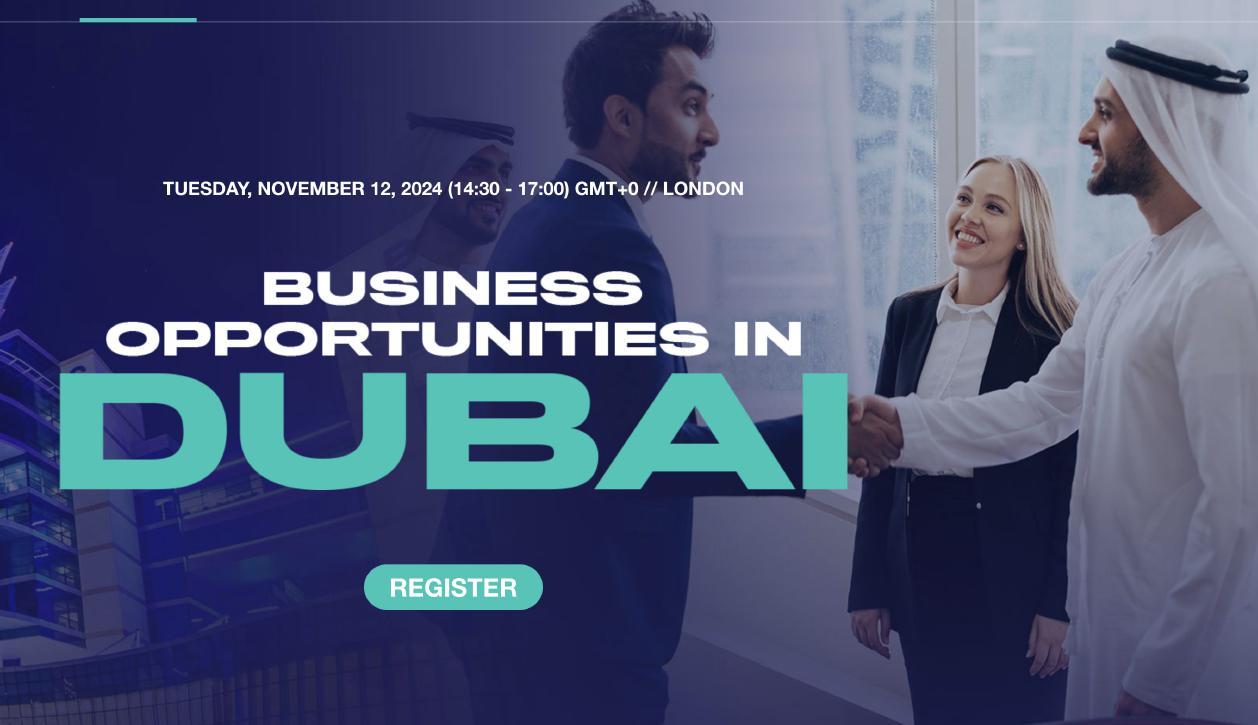
In cooperation with the Embassy of the United Arab Emirates in London and The Dubai Integrated Economic Zones (DIEZ) , the ABCC is pleased to invite you to a special business briefing on multi-sector opportunities in the UAE.
This event will feature senior executives from the DIEZ portfolio of companies visiting London to meet and engage with UK companies and investors. Executives from DIEZ will present the latest initiatives designed to attract companies to one of the world’s most dynamic business hubs, further strengthening the business relationship between Britain and the UAE.
Presenting:
• Dubai Airport Free Zone (Special Economic Zone)
• Dubai Commercity (Special Economic Zone)
• Tradeling (B2B ecommerce platform for MENA region)
• Oraseya Capital (USD 100 Million VC Fund for Tech Companies)
• Halal Trade and Marketing Centre (A Global Business Development Centre for the Halal Industry)
Join us for what promises to be a unique business networking experience with distinguished representation from The United Arab Emirates.
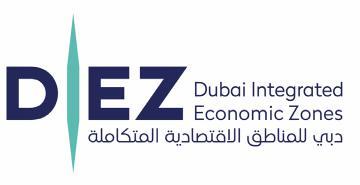
The Dubai Integrated Economic Zones (DIEZ) is committed to
strengthen9ing Dubai’s status as a global business hub. Its advanced ecosystem and international network are embodied in globally recognized zones, attracting foreign direct investments from around the world. The Dubai Airport Free Zone offers pivotal connectivity to markets across the Middle East, Europe, India & the Far east.
Dubai CommerCity advances digital commerce in the MEASA region, while DIEZ’s AED 500 million venture capital fund, “Oraseya Capital,” supports innovative technology start-ups, aligning with Dubai’s vision to lead the global economic landscape and drive growth for global investors.


A
‘I am delighted to invite you to participate in the Arab-British Chamber of Commerce’s flagship event of the year, the 4th Arab British Economic Summit – ‘Friendship Through Trade’.
This annual summit serves as a crucial platform for discussing emerging bilateral business opportunities including sustainable tourism, e-commerce, franchising, and innovations across all sectors among other topics. Now in its fourth year, ABES hosts a distinguished assembly of government ministers, officials, industry leaders, and visionaries from both the UK and the Arab world who convene to explore and debate the burgeoning opportunities that technological innovations and economic shifts are creating. Our past summits have set precedents for success and innovation and the 4th Arab British Economic Summit will not only continue this tradition but will elevate it to new heights.
With over 1,000 delegates registered and more than 35 speakers hosted during the 2023 summit across all sectors, I invite you to be at the forefront of this technological and economic transformation through joining us at this year’s summit. Your participation will offer your company several benefits, including increased brand exposure through numerous speaking opportunities, extensive media coverage and prominent exhibition booths.
Join us to pave the way for a future marked by enhanced collaboration and mutual prosperity. We are excited about the prospects that the forthcoming ABES2025 will open for enlightening discussions and invaluable networking opportunities.’
Mr Bandar Reda ABCC Secretary General & CEO






Head of International Trade
The World Intellectual Property Organisation (WIPO) has published its Global Innovation Index (GII) for 2024, which assesses the innovative capacity of 133 countries around the world. The UAE ranked second in its region of “Northern Africa and Western Asia”. The UK ranked third in Europe.
In the report, WIPO asks the key questions,
What is the current state of global innovation? Is innovation accelerating or slowing down?
How is innovation coping in the face of higher interest rates and geopolitical conflicts?
The Global Innovation Tracker 2024 provides a comprehensive analysis of the current state of global innovation. Findings highlight progress as well as challenges across four key stages of the innovation cycle: science and innovation investment, technological progress, technology adoption, and the socioeconomic impact of innovation.
The report observes that innovation investments witnessed a major downturn in 2023, a reversal of the 2020–2022 boom.
Following a boom between 2020 and 2022, science and innovation investment experienced a significant downturn in 2023.
WIPO points out the following: • Scientific publications dropped by 5 percent in 2023, following growth rates above 8 percent annually in 2020 and 2021, and a slowdown in 2022.
• Global R&D grew at a rate of 5 percent in 2022 – slightly down from 2021 – but is projected to slow to about 3 percent in 2023 (allin real terms).
• Worldwide, R&D expenditure by the highest R&D-spending corporations grew by around 6 percent in real terms in 2023, below the long term growth rate for the last 6 years (around 8 percent) and down strongly from peaks of 10 to 13 percent between 2019–2021, and also from pre-pandemic growth rates (all in real terms).
• Venture capital (VC) and scientific publications have declined sharply back to pre-pandemic levels, with a pronounced impact on emerging regions such as Latin America and Africa. Reflecting a deteriorating climate for risk finance, the value of VC investments has been falling from the exceptionally high levels of 2021, with a 36 percent drop in 2022 followed by a further 39 percent drop in 2023. The number of VC deals has also decreased, experiencing a downturn of 9.5 percent in 2023.
• International patent filings – which had stagnated since 2021 – saw a decline of 1.8 percent in 2023, marking the first such decline since 2009.
Looking forward, while some central banks have started cutting interest rates, tighter conditions for innovation finance might continue to weigh on innovation investment in the near term.
The UAE, Saudi Arabia, Qatar and Morocco are all making progress, according to the report.
In terms of the ranking of country performance with regards to innovation, the WIPO report observes for the Northern Africa and Western Asia region the United Arab Emirates ranked 32nd. Eight economies within the region move up the ranking. Saudi Arabia (47th) and Qatar (49th) each move ahead one spot to consolidate themselves in the top 50. Meanwhile, Morocco (ranked 66th) consolidates its position in the top 70.

Unlocking the promise of social entrepreneurship
The year’s special theme in the report looked to the future of social entrepreneurship and asks: What will it take for social entrepreneurship to catalyse transformative innovation and societal impact?
• The special theme “Unlocking the promise of social entrepreneurship” emphasizes the rise and significance of social entrepreneurship as a global phenomenon aimed at addressing critical social and environmental issues through innovative business models. Social entrepreneurs aim to develop and fund solutions that address societal challenges while generating revenue within the confines of a market economy.
• This approach has gained momentum among young inventors and innovators seeking to align their work with positive social change, especially in areas overlooked by traditional businesses and governments.
• Current estimates suggest there are between 10 and 11 million social enterprises and up to 30 million social entrepreneurs globally, contributing roughly USD 2 trillion to global GDP.
• Social enterprises tackle various issues that include poverty, environmental sustainability and social injustice.
• Despite their impact made by these enterprises, traditional innovation models and policies have largely ignored such community-based ventures.
• The report identifies several barriers to social entrepreneurship, including limited legal frameworks, financing challenges, and inadequate impact measurement.

• Social entrepreneurship operates within diverse definitions and legal frameworks, reflecting the regional histories and policy environments in which they exist. These enterprises often face competing demands between social impact and financial success, beneficiaries and investors, and long-term systemic change versus short-term survival. However, such tensions also serve to drive their innovation potential, by combining aspects of the social sector and the market.
• Social enterprises create impact through various pathways, including customer-focused models that provide essential services to underserved populations, employee focused models that hire and train marginalized individuals, product service-focused models that develop sustainable products, and ecosystem focused models that mobilize diverse stakeholders in order to effect systemic change.
• Innovation in social entrepreneurship often involves process and product innovations tailored to fit local contexts, emphasizing collaboration and open-source strategies. Intellectual property (IP) activity varies, with some enterprises securing patents and trademarks.
• Policy recommendations include developing supportive legal and regulatory environments, investing in education and training programmes, promoting data collection, assisting social entrepreneurs in reaching underserved communities, incubating social enterprise networks, and creating incentives for private investment. Public and private sector collaboration is crucial for addressing these barriers and unlocking the full potential of social entrepreneurship.
• At the same time, the onus for action and change is not only on the actors that surround social entrepreneurs. There is also scope for social entrepreneurs themselves to more actively drive innovation in their ventures. To some extent, this is a matter of social entrepreneurs recognizing the critical role that innovation plays and directing their attention toward key activities such as R&D, process innovation, and patenting and trademarking. But it also involves social entrepreneurs taking concrete actions to embed their enterprises in existing innovation ecosystems. They can do this, by tapping existing sources of scientific and technological knowledge, as well as venture capital, R&D
tax credits, and other innovation finance tools, and by collaborating with universities, public research organizations and other entrepreneurs.
• Ultimately, social entrepreneurship offers a transformative approach to tackling global challenges, by merging business innovation with social goals. By investing in supportive policies, infrastructure and financing, it is possible to create an environment where social enterprises thrive, driving sustainable development and creating lasting positive impacts on a global scale.
Innovation policy, WIPO says, needs to be better designed to support social entrepreneurship, which requires a focus on institutional frameworks, human capital, infrastructure, networks, financing, and measurement. The 2024 edition of the GII addresses these gaps by highlighting the state of social entrepreneurship globally and the role of innovation in creating positive impacts and offers policy recommendations for unlocking the sector’s potential.
To read the full report see the link below, https://www.wipo.int/webpublications/global-innovationindex-2024/en/gii-2024-at-a-glance. html#h2-key-takeaways


Foreign Direct Investment (FDI) has emerged as a pivotal catalyst for growth in the global digital media industry. By bringing substantial capital, cutting-edge expertise and advanced technology to host countries, FDI has significantly transformed the communications and media landscape. According to fDi Intelligence, the communications and media sector ranked third in greenfield investments between 2019 and 2023, underscoring its importance among all FDI sectors.
This influx of investment not only fuels innovation but also fosters economic development, creating new opportunities and enhancing the competitive edge of media companies worldwide in key segments.
The relevance of FDI in digital media can be largely attributed to the global pandemic. While most sectors faced a decline in investment, the media and communication industry saw a rise. The pandemic accelerated the shift towards digital consumption, driving demand for digital content, streaming services and online communication platforms.
According to fDi Markets data, the communications sector was among the top six sectors for FDI capex in 2023, with capital expenditure (capex) reaching
$79.77 billion and the number of projects totalling 679. The sector’s investment increased by 24%, highlighting its resilience and growth potential during a period of global uncertainty.
The media market is set to continue its expansion, with most online media segments outpacing the global growth rate of 3%, as reported by the International Monetary Fund (IMF). The three top segments expected to see the fastest growth from 2022 to 2026 are:
Digital publishing: The accessibility of smartphones and tablets with platforms such as Amazon Kindle and subscription
services has transformed how consumers access books, articles and magazines. Major publishers like Penguin Random House and HarperCollins are now increasingly focusing on digital formats to meet evolving reader preferences, with e-books projected to reach a market volume of USD 15.33 billion by 2027, according to Statista.
In the TV and movie industry, streaming platforms like Disney+, Netflix and Amazon Prime Video are setting new benchmarks. Between 2022 and 2027, Disney+ is expected to increase its annual investment in original content by 82.8%, according to Ampere Analysis, while Amazon Prime Video will increase its investment by 70% over the same period. Audio and music: Streaming services

such as Spotify and Apple Music have driven a revival in the audio and music industry. With millions of songs and podcasts readily available on singular platforms, the shift from physical and digital downloads to streaming is forecasted to grow the market by USD 70,023.6 million from 2023 to 2028, according to the Global Music Market 2024-2028 Report.
Social media: Innovations in content delivery, augmented reality (AR), and virtual reality (VR) are propelling the growth of social media platforms. The global social media market size is expected to grow at a compound annual growth rate (CAGR) of 27.1% from 2023 to 2030, according to the Social Media Market Size, Share and Trends Analysis Report by Application, by Region and Segment Forecasts, 2023 - 2030.
Social media’s highly engaged user base makes them prime targets for advertisers and marketers seeking to reach a wide audience. This, coupled with the rise of influencers and influencer marketing has turned social media into a powerful marketing tool, with brands investing heavily in influencer collaborations and social media advertising, thereby driving further investment into these platforms.
The GCC’s geographical location, bridging East and West, coupled with world-class infrastructure, including cutting-edge media cities and advanced
telecommunications networks, positions it to foster a dynamic environment for media companies and investors alike.
The media landscape in the Middle East and North Africa (MENA) region, particularly in the digital and streaming sectors, has been experiencing significant growth. Currently, GCC consumers have the second highest number of VOD services per person on average in the world, according to the Oliver Wyman Global Survey, while 5G is projected to account for 73% of all mobile subscriptions in the GCC countries by the end of 2026, according to the Ericsson Mobility Report.
Driven by increasing internet penetration, a young and tech-savvy population and the rising popularity of digital entertainment platforms, the region dominated streaming revenues with a 98.4% share of the market, according to the IFPI Global Music Report. This is supported by countries like Qatar establishing partnerships with global media entities like Snap Inc, Amazon Ads and TikTok.
Qatar and Saudi Arabia have also outlined the importance of cultural and media development in their 2030 visions. Saudi Vision 2030 outlines key initiatives to attract FDI and develop its media and entertainment sectors, intending to increase household spending on entertainment and leisure from 2.9% to 6%. Meanwhile, Qatar National Vision 2030 aims to build a sustainable media ecosystem by investing in state-of-the-art media infrastructure and fostering talent.
Media City Qatar, a key enabler of the media industry in the country, is an emerging media hub and incubator for companies, entrepreneurs, innovators and creative talent. It drives initiatives that bridge cultural gaps and foster international cooperation, all centred in Doha. Media City Qatar’s three-part mandate covers regulation, development, and investment—including providing business incubation, permits, licenses and modern production facilities.
These initiatives along with development programmes by educational institutions to upskill labour and the continued growth of media organisations like Al Jazeera and BeIN Sports are expected to yield projected market growth of 10.21% from 2024 to 2029, according to Statista Market Insights.
FDI is a driving force behind the growth of the digital media industry, fuelling innovation and expanding opportunities across various segments. From digital publishing and audio streaming to social media, the influx of international investments is reshaping the media landscape.
The GCC region, with its strategic position and ambitious visions for cultural and media development, stands out as a key player in this evolving market. As technological advancements continue to shape the future of digital media, both investors and media companies are well-positioned to capitalise on emerging opportunities and drive further growth in the sector.
Invest Qatar

The new strategies directly support the Dubai Plan 2033 and Dubai Social Agenda 33, which seek to establish the emirate as a global destination for living, learning and investment.
Sheikh Hamdan bin Mohammed bin Rashid Al Maktoum, Crown Prince of Dubai, Deputy Prime Minister and Minister of Defence of the UAE, and Chairman of The Executive Council of Dubai, on 1 October 2024 approved a series of new plans aimed at boosting Dubai’s leadership in several sectors over the next decade.
The plans approved by The Executive Council of Dubai include the Education Strategy 2033 and the Real Estate Strategy 2033, which aims to increase the value of Dubai’s real estate transactions to Dh1 trillion by 2033. Additionally, three plans focused on modernising Dubai’s
transport infrastructure, transforming the city into a cashless city, and preserving the emirate’s heritage were also approved.
Sheikh Hamdan said that Dubai, under the vision of His Highness Sheikh Mohammed bin Rashid Al Maktoum, Vice President and Prime Minister of the UAE, and Ruler of Dubai, places people at the core of its development.
The Education Strategy 2033 is designed to transform the education system to
ensure high-quality education for all. The strategy aims to build a system that enables Dubai to realise its aspirations, enhances capacity building, and delivers a higher standard of quality. Sheikh Hamdan: “Our strategy for a worldleading education system will foster lifelong learning and equip the next generation of national leaders, grounded in Emirati values and identity, to shape the future.
“HH Sheikh Mohammed bin Rashid has always championed the values of quality education and dedicated zones for academic, university, and knowledge institutions. Now, Dubai is designing
its next decade, and we are building an education system based on the principle of lifelong learning—a system that can adapt to change and nurtures national talents. It will be a future-focused education system that involves both teachers and learners in a continuous journey of creativity and growth.”
Sheikh Hamdan added: “Today, we approved the Education Strategy 2033 under the Dubai Social Agenda 33, targeting a significant shift in our education system. Under the guidance of HH Sheikh Mohammed bin Rashid, Dubai has developed a unique, pioneering global model, and we are now building a more advanced education system in line with this model. This strategy is an investment in Dubai’s future, empowering the next generation with essential skills. We have directed the Knowledge and Human Development Authority [KHDA] to place students at the heart of the new system to equip them with skills to lead and shape the future.”
He continued: “We approved the Real Estate Strategy 2033 to help achieve the Dubai Economic Agenda D33, raising real estate transactions to Dh1 trillion by 2033 and doubling the sector’s contribution to economic diversification. The strategy also boosts Emirati competitiveness and promotes home ownership to enhance family stability.”
The Education Strategy 2033 aligns with Dubai’s 2033 Plan and its social and economic agendas. It focuses on
providing world-class education from early childhood through to higher education, delivered by reputed and respected teachers and academic faculty, fostering lifelong learning with active involvement from parents and the community.
The strategy aims to build a studentcentric system that nurtures talent and creativity and equips students with essential life skills to prepare them for the future. It also emphasises early career guidance and aims to ensure UAE students are among the most competitive, able to secure places at top local and global universities.
By increasing real estate transactions by 70 per cent and multiplying the value of Dubai’s real estate portfolios by 20 times to Dh20 billion, the Real Estate Strategy 2033 aims to contribute Dh73 billion to the emirate’s GDP. The strategy represents a key pillar in the Dubai Economic Agenda D33 and will help elevate Dubai’s investment attractiveness, positioning the city as a highly diverse global economic hub.
The strategy will involve rolling out a series of programmes over the next decade to raise the quality of developments, enhance transparency, leverage data for better market forecasting, integrate AI within the sector, centralise data and offer
high-grade assets. The aim is to attract investment as well as improve the buying and selling experience. In addition, the strategy prioritises sustainability and the development of balanced, cohesive communities, aiming to raise homeownership rates to 33 per cent.
The Dubai Cashless Strategy aims to position Dubai as one of the top five cashless cities globally by 2033. The strategy will increase digital transactions across all sectors, contributing Dh8 billion to the economy and ensuring that 100 per cent of businesses in Dubai accept digital payments.
The Suspended Transport Systems Project is an essential part of Dubai’s Smart Mobility Strategy. By 2030, Dubai aims to automate 25 per cent of all trips through the implementation of a newly approved 65km system connecting Umm Suqeim Street, Al Khor and Zabeel. The new system will help increase the share of public transport journeys in Dubai to 26 per cent of all trips by 2030. In addition, it will be integrated with other modes of transportation to help people move around the emirate efficiently and sustainably.
Sources: Gulf News, Khaleej Times


Expressions of interest invited
Emirates Water and Electricity Company (EWEC) has invited developers and developer consortiums to submit an expression of interest (EOI) for the development of a new solar photovoltaic (PV) independent power project (IPP) to be located in the Al Dhafra Region, in the Al Zarraf area in the Emirate of Abu Dhabi.
The Zarraf Solar PV project is a greenfield solar power project with a generation capacity of 1.5 gigawatts (GW) AC, and will be similar in scale and production capacity to Al Dhafra Solar PV, Al Ajban Solar PV, and Khazna Solar PV.
Once fully operational, the project will generate enough electricity for approximately 160,000 homes across the UAE, reducing CO2 emissions by more than 2.4 million metric tonnes per year and raising EWEC’s total solar power capacity to approximately 7 GW (AC).
Zarraf Solar PV is EWEC’s fifth worldleading utility-scale solar PV project, supporting the acceleration of renewable and clean energy capacity in the UAE under EWEC’s strategic plan to build an average of 1.4GW of new solar PV capacity annually between 2027-2037.
By 2030, EWEC forecasts that more than 50 percent of Abu Dhabi’s electricity demand will be met from renewable and clean energy, and by 2035, 60 percent of Abu Dhabi’s total power demand will be met from renewable and clean energy sources.
Othman Al Ali, Chief Executive Officer of EWEC, said, “The Zarraf Solar PV project is a key component of EWEC’s world-leading deployment of solar power generation, as we strategically accelerate the UAE’s energy transition. We are proud to be leading the transformation of the energy ecosystem by commissioning and deploying new low-carbon technologies. We look forward to receiving expressions of interest for the development of the Zarraf Solar PV project, and welcome those willing to join us on our journey to decarbonise the energy sector.”
The Zarraf Solar PV project will involve the development, financing, construction, operation, maintenance and ownership
of the solar PV plant and associated infrastructure. The project will follow the independent power project programme of Abu Dhabi, where developers enter into a long-term power purchase agreement with EWEC as the sole procurer of electricity.
Following a review of the EOIs, EWEC will issue the Request for Qualifications (RFQ) to proceed to the next stage. The RFQ will provide additional details regarding the project, pre-qualification criteria and the bidding process.
After the RFQ, the Request for Proposal to qualified bidders will be shared following regulatory approval of the project.
EWEC invites developers or developer consortiums to submit an Expression of Interest (EOI) by the deadline of 22nd October 2024, at 12:00 noon Gulf Standard Time (GST).

Interested parties are requested to submit their EOI via electronic copy to: zarrafpv.project@ewec.ae.
Egypt’s Minister of Petroleum and Mineral Resources, H E Karim Badawi, has outlined the range of investment opportunities in the country’s petroleum sector and the crucial role of stakeholders in promoting these ventures to attract new investments, aiming to boost production levels.

The minister mentioned that some 42 distinct opportunities were currently offered through the Egypt Upstream Gateway, which reflects the potential of the country to position itself as a regional energy hub.
The EUG represents the gateway to Egypt’s upstream investments and is the outcome of the Sector Modernisation project that was launched in 2016. The EUG aims to digitally promote Egypt’s oil and gas bid rounds through seamless online access to the sector’s data.
The EUG is motivated by a vision of optimising the value of E&P data by attracting global investment to the upstream sector to boost production.
Its mission is to build a fully integrated platform for Egypt to enable seamless
data access and offer the opportunity to explore new plays, prospects and evaluate basins’ potential.
It provides a digital platform to promote upstream opportunity.
The EUG sets out to provide investors with,
• Faster and easier access to data.
• Online data visualization and delivery.
• Access to trusted data.
• Data trading for proprietary data.
• Securely manage confidential data, including access controls for proprietary data.
• Global access through the EUG portal.
• A Virtual Data Room with application access and workflow that represent the perfect platform for license bid round.
The EUG acts as a unique and innovative national project for digitising subsurface information and delivering a digital subsurface platform to ensure Egypt’s subsurface data is kept evergreen. It will also promote Egypt’s exploration and production potential to potential investors worldwide. For more information, contact: info@eug.petroleum.gov.eg


Iraq has approved a series of infrastructure projects, focussing on the construction of roads and bridges.
These projects from the Iraq Ministry of Construction, Housing, Municipalities and Public Works aim to improve connectivity and support economic growth across various provinces.
Key projects announced for development include:
Baghdad:
Preparation of studies and technical feasibility for the construction of the road (Amara - Kut - Baghdad - Kirkuk)
Rehabilitation of the expressway (Baghdad - Abu Ghraib)
Reconstruction of the Al-Fadhiliya concrete bridge
Rehabilitation of Bab Al-Muadham bridge
Rehabilitation of the Great Baghdad bridge
Rehabilitation of Expressway No. 1, Section T(4), Phase II
Kirkuk: Maintenance project for the road (Kirkuk - Sulaymaniyah)
Karbala:
Maintenance of the old Tharmaston road
Connecting the city of Karbala to the expressway
Karbala bypass road project
Najaf:
Widening project of the road (KiflNajaf)
The fifth Kufa bridge
Wasit:
Maintenance of the old road (Kut - Badra - Mehran)
Construction of the second lane for the road (Jehan - Dabouni)
Second lane of the road (Suwaira - Jableh - Expressway)
Expansion and rehabilitation of the main road (Kut - Baghdad)
The second Numaniyah bridge
Diwaniyah:
Project for the main road (DiwaniyahHilla), Phase I
Diyala:
Paving various roads in the entire district of Khalis and its surrounding areas
Nineveh:
Second lane adjacent to the old Qayyarah bridge
Road (Sinjar - Umm Jaris) with a length of 35 km
Muthanna:
Al-Jamiyah border crossing
Salah al-Din:
Overpasses at the Balad intersection on the road (Baghdad - Mosul)
Those seeking further details should see the ministry’s website, https://www.moch.gov.iq/
Source: Ministry of Construction, Housing, Municipalities and Public Works, Republic of Iraq


Support for startups and SMEs in Oman forms an integral part of the nation’s Vision 2040 transformation.
The latest initiative in support of startup companies in Oman was unveiled on 2 October 2024 with the launch of the Startup Accelerator Initiative by the Programme of Omani Promising Startups, known as POPS.
The new initiative was launched in cooperation with the Oman Authority for Small and Medium Enterprises Development (ASMED), the Public Establishment for Industrial Estates (Madayn), the Industrial Innovation Academy and various regional and international partners.
The Accelerator seeks to empower owners of innovative ideas, support the establishment of emerging Omani
companies and link them to business and investment opportunities with the aim of supporting expansion locally, regionally and globally.
The initiative benefits from advanced technologies in various sectors and industries. The Accelerator facilitates financing opportunities, integrated training, guidance and consultations necessary to achieve success and growth for the startups.
The POPS programme, meanwhile, focuses on activating the business accelerator through two main stages. The first is the “Idea Stage” which accommodates 20 innovative ideas from various economic sectors, with emphasis on enabling innovators and
owners of pioneering ideas to develop innovative solutions in economic sectors and advanced technologies. This paves the way for entrepreneurs to transform their ideas into executable and scalable products and services.
The second stage (“pre-seed stage”) targets 20 projects in vital sectors such as health, tourism, real estate, food security and public services. This serves as a strategic step to enable projects to face future challenges and achieve sustainability in local and regional markets.
The Accelerator will provide a comprehensive set of services designed to meet the needs of startups. The services include the following:


• Mentoring and guidance by a group of specialized experts and mentors;
• Training covering all aspects of entrepreneurship;
• Providing advanced office spaces that enhance the environment of innovation and entrepreneurship;
• Offering investment opportunities to help companies expand regionally and internationally; and
• Providing integrated marketing support to develop strong professional relationships through international and regional events and exhibitions.
Ultimately the available support seeks to transform startups into practical solutions that meet market needs.
The Rising Omani Startups Programme is a three-year national programme aimed at stimulating the ecosystem of emerging startups based on advanced technology and innovation in Oman, contributing to spreading the culture of startups in educational institutions, enhancing community awareness of their importance, and escalating the Omani startups in regional and global markets. This programme has three main pillars: capacity building, financing and investing, and a supportive regulatory framework.
The Authority for SMEs Development has registered more than 100,000 SMEs and startups. It offers six incubation programmes to empower innovation- and technology-based startups, supports youth orientation toward entrepreneurship, and provides funding to guarantee the continuity of SMEs.
The Ministry strives to make transport and logistics the second source of national income and within the top 10 in logistics performance at the international level by 2040. It formulates and implements digital strategies and programmes.
Omantel Innovation Lab, the innovation arm of the leading provider of integrated telecommunications services in Oman, leverages Omantel’s expertise, reach, partnerships and access to technology to promote innovation and entrepreneurship in new and emerging technologies.
The Oman Investment Authority (OIA) is the Sultanate of Oman’s investment arm, managing and investing state funds and assets to advance economic sectors. OIA spent some OMR187 million on 8,000+ SMEs and startups
in 2022 and invests in 40+ countries worldwide.
Oman’s Ministry of Higher Education Research and Innovation (MOHERI) has a vision of a comprehensive higher education, sustainable learning, and scientific research leading to a knowledge society and competitive national capabilities. The ministry offers opportunities in entrepreneurship education, including workshops and dedicated university programmes.
The Oman Future Fund is a $200 million initiative aimed at driving Oman’s economic diversification and promoting sustainable development. Focused on high-growth sectors including technology, renewable energy, and healthcare, it supports Oman’s Vision 2040.
This extensive ecosystem of support for startups forms a part of Oman’s Vision 2040 which signifies a shift from an oil-dependent economy to a more sustainable, prosperous, and diverse economic landscape. The implementation of this vision is financed by $39 billion in investments and 6,500 industrial projects that are offering 270,000 job opportunities. The various programmes unveiled under Vision 2040 foster innovation, enhance competitiveness, and identify sectors for development.
As His Majesty Sultan Haitham Bin Tarik Al Said, Sultan of Oman, has said,
“We are aware of the importance of the small and medium enterprises sector and the entrepreneurship sector, especially startups that are based on innovation, artificial intelligence, and advanced technologies. We are training young people and enabling them to take advantage of the opportunities offered by this vital sector to be a basic building block in the national economy.”

In an effort to strengthen its creative economy, the UAE Ministry of Economy and the Dubai Future Foundation (DFF) have unveiled the Dubai Intellectual Property Hub (DIPH).
The initiative is the UAE’s first centralised platform dedicated to intellectual property (IP) and intangible assets, and is designed to empower diverse stakeholders, including innovators, artists, entrepreneurs, researchers, and startups.
The platform was announced at the “IP2024: Glimpse on the Future of IP” event held at the Museum of the Future on 1 October 2024, where a Memorandum of Understanding was signed between the UAE Ministry of Economy and the DFF. The signing took place in the presence of His Excellency Abdullah Bin Touq Al Marri, the Minister of Economy; H.E. Alia Abdulla Al Mazrouei, Minister of State for Entrepreneurship; His Excellency Dr. Abdul Rahman Al Muaini, Assistant Undersecretary for the Intellectual Property Rights Sector at the Ministry of Economy, and His Excellency Khalfan Belhoul, the CEO of DFF.
Under the terms of this MoU, the Ministry of Economy’s feature for registering IA will be integrated into the Dubai Intellectual Property Hub.
Reinforcing Dubai’s position as a centre for technology, the new platform will benefit a wide range of entrepreneurs, innovators, startups, artists, creatives, innovators, researchers and academics working in fields such as creative design, sustainability, health, education and the legal sector.
At the launch, H E Abdullah Bin Touq Al Marri highlighted the UAE’s unwavering commitment to fostering a vibrant ecosystem that nurtures innovation,
stimulates the development of ideas, and supports the growth of creative businesses.
The nation, the minister said, has successfully built a comprehensive legislative and institutional framework, further bolstered by integrated services designed to protect intellectual property rights across all sectors, in alignment with international best practices.
These endeavours are pivotal in realising the aspirations of the “We the UAE 2031” vision, which seeks to position the UAE as a global leader in the new economy and among the top 10 destinations worldwide for talent and creativity over the next decade.
Minister Al Marri added, that the launch of the Dubai IP Hub, in collaboration with the Dubai Future Foundation, marks a crucial advance in fortifying intellectual property protections for the creative industries, both in Dubai and across the entire UAE.
It is a strategic initiative that equips entrepreneurs, authors, creatives, and researchers with the necessary tools and resources to secure and formalise their innovations, thereby reinforcing the nation’s economy, which is increasingly driven by creativity and innovation.
For the DFF, H E Khalfan Belhoul, stated: “The collaboration with the Ministry of Economy in developing this platform is part of ongoing efforts to advance the UAE’s legislative framework, strengthen the readiness of all economic sectors,
and create a robust R&D ecosystem. By providing vital tools for businesses to thrive, we aim to support their growth and expansion within the UAE, the region, and on a global scale.”
Belhoul added: “The launch of Dubai IP Hub seeks to create a comprehensive and reliable resource for entrepreneurs, offering seamless access to essential information, resources, guidance, and cost details related to intellectual property registration. We remain committed to working with key stakeholders across government, legislative, academic, and entrepreneurial sectors to cement Dubai and the UAE’s position as global leaders in creativity and innovation.”
Focusing on four main pillars, DIPH will provide guidelines for registering all types of intellectual property through a seamless digital experience. It will offer a comprehensive and trusted source of information as well as guidance on IP protection and commercial exploitation by providing tools and resources to develop IP strategies.
One of the hub’s main features is a seamless digital interface that centralises all relevant information, tools, guidelines and resources in a single, easily accessible place.
The website for the hub opens with the words, “We’re here to help your ideas prosper, whether you’re an artist, inventor, or a visionary.”
To learn more about the Dubai Intellectual Property Hub, please visit the website: https://www.dubaiip.ae/

The Middle East is the strongest-growing region for tourist visitors in the first seven months of 2024, with international arrivals climbing 26% above 2019 levels, the UN World Tourism Organisation has revealed, with the Kingdom of Saudi Arabia making its mark as a global destination for tourism.
Saudi Arabia was the fastest-growing G20 country for tourism, the UN World Tourism Barometer states. According to a September report, Saudi Arabia leads both in the growth of international tourist numbers and in tourism revenues, SPA reported.
The Saudi Ministry of Tourism revealed that 4.2 million tourists had arrived for purposes of holidaying and entertainment in the first seven months of 2024, representing a massive 25% increase over the previous year.
The Ministry said that there had been a 8.2 percent growth in spending by foreign visitors during the first half of 2024, compared with the first half of 2023. The total spend by visitors amounted to $24.5 billion (about SR92.6 billion).
These impressive results herald success for the Kingdom’s strategic focus on tourism which in recent years has witnessed investment in developing a sustainable tourism sector. This has involved improving the infrastructure that supports the sector, such as hotels and transport links, and promoting the country as a premier global destination.
This achievement reflects the scale of efforts made by the Ministry of Tourism and other entities in the Saudi tourism system to enhance the sector and
contribute to the growth of the national economy, as part of the National Tourism Strategy, Arab News reported.
Elsewhere, Africa welcomed 7% more tourists in 2024 than in the same months of 2019, according to the UNWTO.
In total, an estimated 790 million tourists travelled internationally in the first seven months of 2024, about 11% more than in 2023, the UNWTO said.
The UN Tourism World Tourism Barometer monitors short-term tourism trends on a regular basis to provide global tourism stakeholders with up-to-date analysis on international tourism.
The report is published four times a year and includes an analysis of the latest data on tourism destinations (inbound tourism) and source markets (outbound tourism).
For more on global and regional tourism trends see the UNWTO,
https://www.unwto.org/untourism-world-tourism-barometerdata#:~:text=The%20UN%20 Tourism%20World%20Tourism%20 Barometer%20monitors%20shortterm%20tourism%20trends
The attraction of the Kingdom for tourists is being boosted by the development of a series of spectacular new megaprojects that are enhancing the country’s tourism and entertainment landscape.
Tourist attractions including golf courses, theme parks and hotels are built in features of megaprojects like Qiddiya City, which is described as an “exciting new destination city right on Riyadh’s doorstep”. Located in the Tuwaiq mountains, just 40 mins away from the capital, Qiddiya City is connected by major highways and Riyadh’s public transport network.
The latest addition to this megaproject is a new $1.1 billion stadium recently announced by developers, Qiddiya Investment Company (QIC), a unit of Saudi Public Investment Fund PIF). The QIC appointed a consortium of Spain’s FCC Construcción and Saudi contractor Nesma & Partners for the construction of the Prince Mohammed bin Salman Stadium.
With a capacity for 46,000 spectators, the stadium is expected to become a standout futuristic venue with unmatched design, standing as a symbol of Saudi Arabia’s commitment to developing a vibrant cultural and entertainment landscape, said QIC in a statement. It is scheduled for completion in 2029.
https://qiddiya.com/qiddiya-city/
A new report has highlighted impressive growth trends in the GCC thriving retail industry.
The GCC Industry report issued by Alpen Capital describes a retail sales boom with a compound annual growth rate (CAGR) of 4.6% with sales rising to $396.9 billion by 2028 up from $309.6 billion in 2023.
According to the report, the GCC retail industry has been witnessing steady growth, since recovering from the COVID-19 induced slowdown and global macro-economic concerns.
Growth has been supported by expanding populations, rising income levels, coupled with expatriates and tourists returning to the GCC amid stabilising local economies.
At the same time, Alpen Capital says, various initiatives taken by regional governments, especially towards boosting physical and digital infrastructure, strengthening the investment landscape, and facilitating tourism demand, have aided this retail growth.
As the industry continues to mature, several emerging trends and evolving consumer preferences are reshaping the market dynamics. Amid the growing prominence of e-commerce, traditional retailers are fast embracing omni-channel strategies and focusing on differentiating themselves through innovative offerings to offset the margin pressures arising from increasing competition.


As such, the industry is constantly transforming and reinventing itself by deploying higher levels of automation and advanced technologies in a bid to streamline the ecosystem.
The region has emerged as an attractive destination for global investors with the real estate, retail, tourism and hospitality industries becoming key barometers of growth. The report states that long-term prospects of the industry continue to remain positive owing to the expected economic recovery, favourable demographics, relaxation of visa rules and liberalisation policies, coupled with retailers adopting dynamic business strategies to better meet evolving consumer demand.
Assessing the outlook for the industry, the report states that GCC retail sales are projected to grow at a CAGR of 4.6% to reach US$ 386.9 billion in 2028 from US$ 309.6 billion in 2023.
Non-food retail sales, meanwhile, are anticipated to grow at a CAGR of 4.3% while food retail sales are expected to rise at a pace of 5.0% CAGR between 2023 and 2028.


According to the report, Saudi Arabia and UAE will continue to lead the region’s industry growth. Retail sales in Saudi Arabia and UAE are projected to grow at a CAGR of 5.1% and 5.4% between 2023 and 2028 to reach US$ 161.4 billion and US$ 139.1 billion, respectively.
Duty free sales at airports in the GCC (Dubai, Abu Dhabi, Qatar and Bahrain) are expected to reach US$ 4.7 billion in 2028, growing at a CAGR of 9.3% between 2023 and 2028.
Such growth can be attributed to an anticipated rise in passenger traffic, largely driven by government initiatives to promote their tourism industries.
Personal luxury goods sales in the Middle East, which are primarily led by the GCC, are forecast to reach US$ 20.2 billion by 2028, growing at a CAGR of 6.5% since 2023.
At 80% completion of projected additions, 3.9 million sq. m. of retail space is likely to come up in the GCC between 2023 and 2028, taking the total organised retail GLA to 24.3 million sq. m. This is a modest growth scenario, wherein organized retail GLA is anticipated to grow at a CAGR of 2.9% during the period.
The report pinpoints the key growth drivers as economic activity in the GCC which is expected to pick up as business confidence in the region regains momentum with the rise in oil revenues and robust nonhydrocarbon growth, driven by government-led reforms to diversify the economy.
Moreover, improvements in per capita income will increase domestic consumer demand and discretionary spending. This anticipated rise in spending power is also likely to improve the appetite for global brands and luxury items.
Another factor is rising population, with a high concentration of expatriates and HNWIs, which will remain one of the primary factors for driving growth of the GCC retail industry. The region’s population is
expected to grow at a CAGR of 1.8% between 2023 and 2028.
Amid expanding infrastructure developments, the GCC economies are establishing themselves as a hub for global business, entertainment, and sporting events.
At the same time, religious tourism has been a key driver of growth within the GCC, attracting a large portion of tourist arrivals, especially during pilgrimages and other festivals.
Consequently, international tourist arrivals are anticipated to grow at a CAGR of 6.1% between 2023 and 2028 to reach 109.8 billion.
Existing Free Trade Agreements coupled with ongoing negotiations with several countries from across the globe are expected to increase the range of foreign products available within the domestic retail outlets and also expand the establishment of international brands within the region.
Looking ahead, the report examines some key trends in the industry, stating that as it continues to mature, retailers have started to focus on developing new business models while creating value creation opportunities through digitisation.
The report identifies e-commerce are likely to play a pivotal role in driving the industry forward in future while traditional players focus on organic strategies to expand across the region.
The report goes on to examine in detail the specific trends within each of the GCC countries in turn.
To read the full 100-page report from Alpen Capital, follow the link below, https://alpencapital.com/https:// alpencapital.com/research/2024/ alpen-capital-gcc-retail-industry2024-consolidated-version.php
Deftly weaving real life stories of some of the most colourful figures from the time of World War II Paris with an ingenious art thriller plot that brings the narrative up to the high octane auction houses of today. In the Frame is a page-turning adventure that is at once historically fascinating and dramatically compelling. What were the links between Hermann Göring and Coco Chanel? What became of the Nazi’s hidden art plunders once they had been defeated? And what dark secrets must a new generation confront to get to the ingenious truth behind the iconic artworks we see in our galleries today? This passionate celebration of art history’s intrigues, conjured from fact and fiction, is an adventure to delight and entertain.
To secure a copy of the book, contact the author by email at:
Available from Nomad Publishing https://nomad-publishing.com/in-the-frame.html#
For more information visit www.lorraineamrani.com


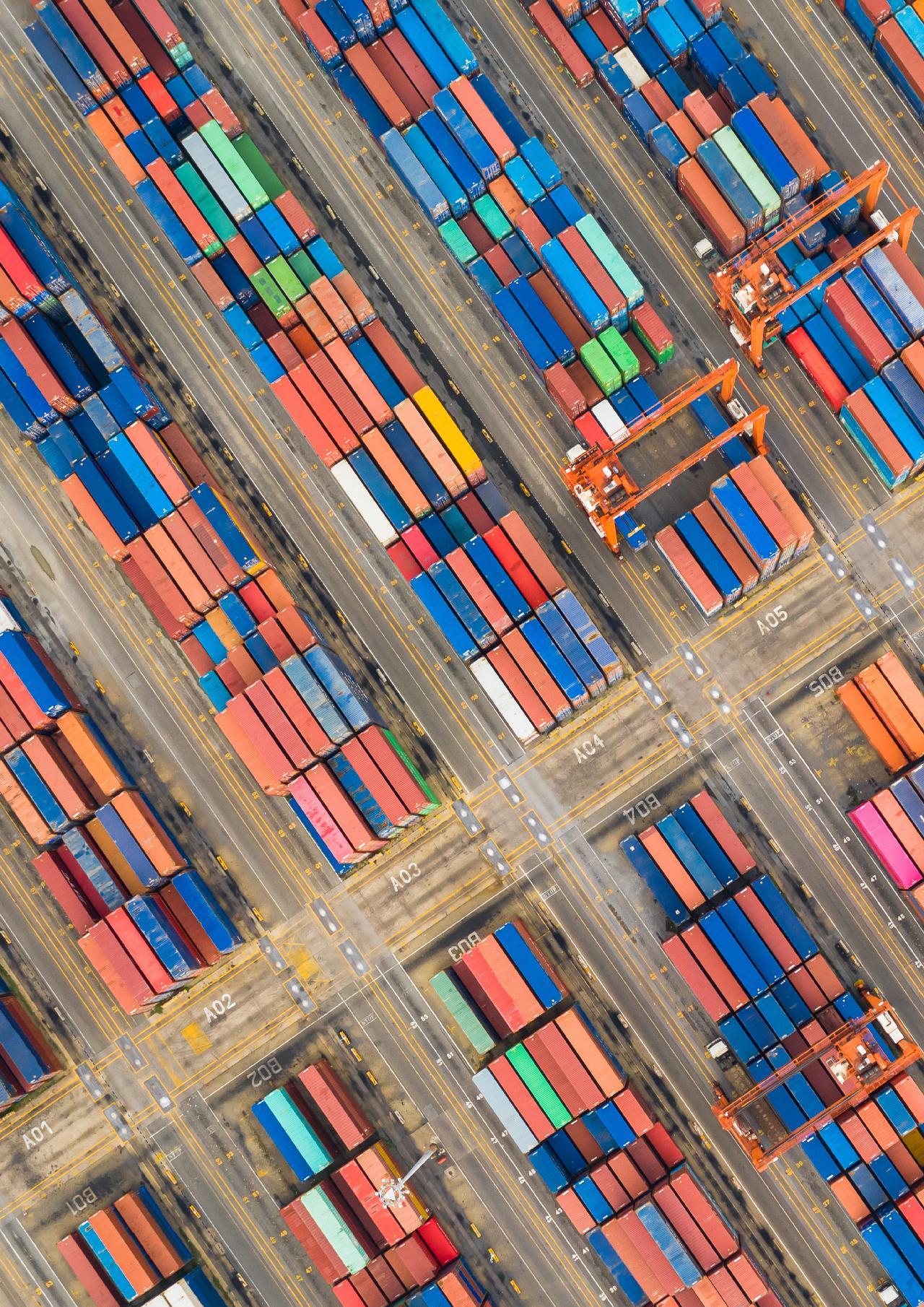
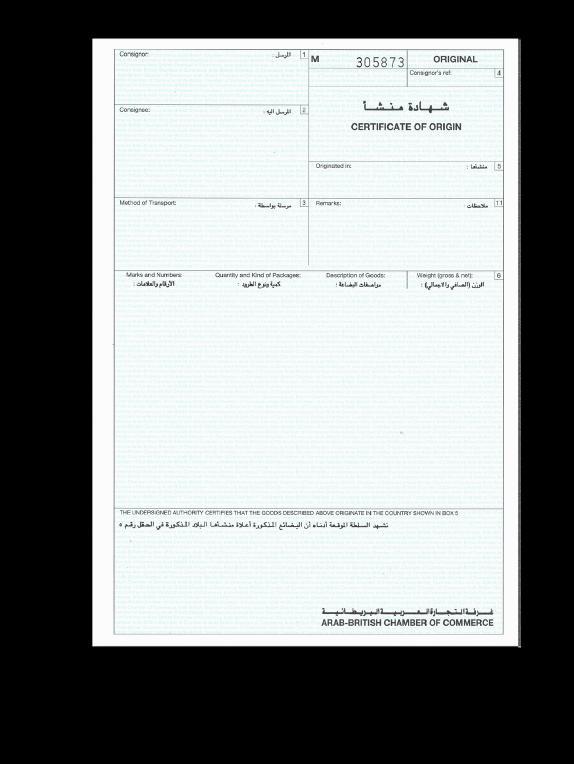
Surrounding the uncertainty of Brexit, the Arab-British Certificate of Origin remains the certain method to trade with the Arab world. There will be no changes to the certificate, and the ABCC’s services will suffer no interruption irrespective of Brexit’s outcome.
The Arab-British Certificate of Origin remains the only certain, secure and reliable means of export documentation for companies trading with the Arab world. There have been no changes to the certificate, and, likewise, the ABCC’s range of trade services remain entirely unaltered in the post-Brexit trading environment.
We at the ABCC remain available to support your exporting and wider business needs.
We at the ABCC remain available to support your exporting and wider business needs. www.abcc.org.uk
At Waltons Digital Media, we blend creativity with technology to elevate your brand online. Our comprehensive services include tailored digital marketing strategies, visually stunning web design and development, engaging content creation, and impactful graphic design. We focus on delivering solutions that drive engagement, enhance visibility, and ensure your brand stands out in a crowded digital landscape. With a commitment to quality and innovation, we partner with you every step of the way to bring your vision to life and achieve lasting success in the digital world. Let’s create something extraordinary together, turning your ideas into powerful digital experiences that resonate with your audience and leave a lasting impact.



At Walton’s Digital Media, we create content that grabs attention and builds lasting connections with your audience.

At Walton’s Digital Media, we offer expert Marketing Consultancy services to provide strategic direction and hands-on guidance.

Sameh Metawea BA (Hons) Head of Client Services

At Walton’s Digital Media we craft powerful, results-driven digital and marketing strategies tailored to your business.

Walton’s Digital Media offers expert Communication and PR services, from crafting compelling messages to managing crises effectively.


At Walton’s Digital Media, we specialise in Graphic Design & Branding services that enhance and strengthen your brand.

At Walton’s Digital Media, we design custom, mobile-responsive websites that are visually stunning on any device.


